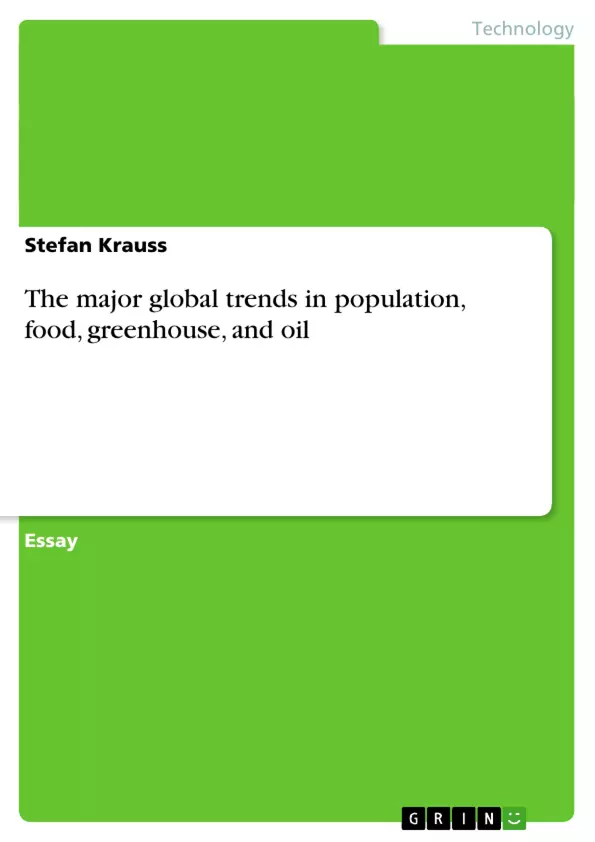In order to answer questions, it is always advisable to step back and reflect upon what the speech-parts used mean. The question contains the four title-like terms 'population', 'food', 'greenhouse', and 'oil' referring to global issues that are heavily and controversially discussed by the political and academic community. It is to be emphasised that these issues are highly intertwined and pose various environmental, economical, social, political, and cultural challenges. The question supposes that there are "major trends" in these issues. Moreover, the usage of the definite article seduces one to assume that there is a fixed set of major global trends. Considering the often different, even contradictory, analysis, predictions, and instructions that different people make, one has to question who determines global trends. Is it Björn Lomborg, who plays down concerns wherever possible? Or rather Lester Brown, who alarmingly advises fundamental changes in current patterns of human (economic) behaviour? What could the indicators be that allow the claim of a global trend? These questions must be answered in another essay. For this essay it is sufficient to say that there is a vast number of different data sources, and various different methods for interpreting the data. Additionally, the diagnosis of a global trend is a means to an end determined by humans with certain worldviews and aim s. Differentiations are always decisions - they have impacts on political agents, the common people, and the future of planet earth.
Inhaltsverzeichnis (Table of Contents)
- REMARKS ON THE QUESTION.
- GLOBAL TRENDS IN POPULATION, FOOD, GREENHOUSE, AND OIL...
- HOPEFUL CHANGES: THE GREENHOUSE EFFECT AND CLIMATE CHANGE
- BARRIERS TO CHANGE: THE GREENHOUSE EFFECT AND CLIMATE CHANGE.....
- CLOSING WORDS
Zielsetzung und Themenschwerpunkte (Objectives and Key Themes)
This essay aims to analyze major global trends in population, food, greenhouse gases, and oil, with a particular focus on the greenhouse effect and climate change. It examines both hopeful developments and obstacles to reversing these trends. The essay also explores the broader implications of these issues for sustainability and the future of planet Earth.
- Global Trends in Population, Food, Greenhouse Gases, and Oil
- The Greenhouse Effect and Climate Change
- Hopeful Developments and Obstacles to Change
- Sustainability and the Future of Planet Earth
- The Role of International Cooperation and Policy
Zusammenfassung der Kapitel (Chapter Summaries)
- Remarks on the question: This section introduces the essay's main topic and explores the complexity of defining "major global trends." It emphasizes the diverse perspectives and interpretations surrounding these issues.
- Global trends in population, food, greenhouse, and oil: This chapter provides an overview of key trends in population, food production, greenhouse gas emissions, and oil consumption. It highlights the interconnectedness of these issues and their potential impact on the environment and society.
- Hopeful changes: the greenhouse effect and climate change: This chapter focuses on hopeful developments and positive changes related to the greenhouse effect and climate change. It examines international agreements like the Montreal Protocol and the Kyoto Protocol, and highlights exemplary policy initiatives taken by Germany to mitigate greenhouse gas emissions.
Schlüsselwörter (Keywords)
The key focus topics of this text include global trends, population growth, food security, greenhouse gas emissions, climate change, sustainability, international cooperation, policy initiatives, and renewable energy sources. The essay also touches upon concepts like the Montreal Protocol, the Kyoto Protocol, and the Renewable Energy Sources Act.
Frequently Asked Questions
What are the four major global issues discussed in this essay?
The essay focuses on the interconnected trends in population, food security, the greenhouse effect, and oil consumption.
How are population and food trends related?
As the global population grows, the demand for food increases, posing significant environmental and economic challenges for sustainable production.
What are the main barriers to fighting climate change?
Key barriers include economic dependence on fossil fuels (oil), varying political interests, and differing scientific interpretations of data.
Which international agreements are mentioned regarding the greenhouse effect?
The essay discusses the Montreal Protocol and the Kyoto Protocol as significant efforts to mitigate greenhouse gas emissions.
Who determines what constitutes a "global trend"?
The essay questions how trends are defined, noting that different figures like Björn Lomborg or Lester Brown offer contradictory analyses based on their worldviews.
- Quote paper
- Stefan Krauss (Author), 2004, The major global trends in population, food, greenhouse, and oil, Munich, GRIN Verlag, https://www.grin.com/document/33632



